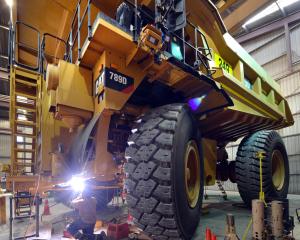The Simpsons, who are in their 50s, work for East Coast Transport Services and drive workers to and from the Macraes mine seven days a week.
It was a change of focus for the couple when the service started from Oamaru in October 2008.
While Mrs Simpson had experience as a bus driver, her husband had spent 11 years at the Alliance Group's Pukeuri freezing works and came from a farming background.
Mrs Simpson grew up with the owner of the business, Michael Chittock, in Tapanui, and he called one day "out of the blue" to see if she knew of any bus drivers in Oamaru.
Mr Simpson had decided he wanted to leave the freezing works and said he would take the job.
Then Mr Chittock realised he needed to run two buses, so they now provide the service as a husband-and-wife team.
The first bus leaves Oamaru at 5am, picking up workers all the way to Palmerston and arriving at the mine at 6.25am.
The bus then leaves Macraes at 7am, bringing the night-shift workers home, arriving back in Oamaru by 8.15am.
The next trip leaves Oamaru at 3pm and travels to the mine empty to get the office staff and then there is another trip leaving at 5pm, returning to Oamaru by 8.15pm.
The couple work alternate days, with one doing the 5am and 5pm runs and the other doing the 3pm trip in the 24-seater buses - appropriately with the slogan on the number-plate - Minerliner.
The runs operate seven days, although the office is only open Monday to Friday, so one of them does the Saturday and Sunday trips.
The number of workers they transport varies, depending on the shifts, but averages about 12.
Some days it could be quite social, as the workers chatted - "You hear all sorts of stories" - while other days, you could hear a pin drop all the way because they were so tired, Mr Simpson said.
With a 200km round trip, it would be easy to think it might get boring, but that was not the case.
"Every day's different - the sunrises and the weather. There's always something happening down the road.
"It's amazing how many accidents you see," he said.
Mrs Simpson described it as a "wonderful" trip.
Her 6-year-old grand-daughter accompanied her in the school holidays and thought she was on top of the world.
In the winter, the drivers encounter snow and ice and sometimes the buses are buffeted by strong winds ripping across the exposed landscape.
The Simpsons say the big advantage of the job is that they are home all day and all they need to do is take care of the buses.
They say it is a great way to work together and while some people cannot understand how they could live and work together, they were still seven hours apart "which is normal", Mrs Simpson said.
The hours of the job did take some adjusting to initially, but they no longer had to have "grandma and grandad naps" in the afternoon, she laughed.
They had a relief driver they could call on if they wanted to go somewhere together.
The bus trip was a great service for the workers, as it saved them from having to drive home after a long, tiring day at work, Mr Simpson said.
Those who worked underground were delivered to the mine in the dark, spent their shift working underground and then were driven home in the dark.
It was surprising how many mine workers had moved to Oamaru now there was a bus service, Mrs Simpson said.
They enjoyed meeting the workers.
Some only lasted a short time at Macraes and were not seen on the bus again.
Neither of the Simpsons has any desire to work at the mine, "This suits us fine," Mrs Simpson said.



